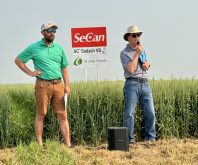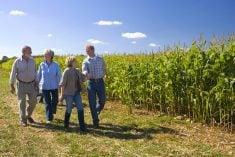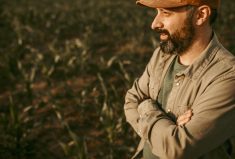All Canadians pay close attention to the calendar and clock, but no one more than the Canadian farmer, whose livelihood has always depended on the tactical use of limited hours, days and months.
Now comes summer 2020, and on top of all the uncertainties of weather, pests and markets, there’s no end to the COVID-19 shocks rippling through the industry.
The reality of today’s agriculture, though, is that the big decisions won’t take 2020 off, no matter what the year throws at us.
Read Also

Youth motivated to find answers to today’s agricultural challenges
This is the first in a series of articles exploring the perspectives and experiences of young people who are finding…
Every year must be a year of progress in the big picture.
Country Guide spoke to four farms, not only about how they manage their schedules during the summer, but also how they make time for overall business management during peak production seasons.
What did we find? Busy people naturally feel short of time. But they also know how to make time for what they want and need to do.
These farms are as professional in their time management as they are in any other aspect of their farming.
Not surprisingly, you’ll find they also know there has to be time for life as well. It’s how they keep control.
Make time for the biggest decisions
Farmers all across Canada will find themselves nodding with Wade Bleier when he describes the kind of thinking that is becoming more and more central to the success of his Saskatchewan farm.
For Bleier, it’s become critical to measure how much time he spends working on the farm, versus how much managing it.
“That’s a bit of my problem,” he says, and again, other farmers will sympathize. “It’s that when I’m being a worker or labourer and working alongside all my employees, it takes away from the time that I have when I need to manage the farm and the businesses.”
But Bleier has found practical ways to divide up his time. He’s making progress.
Bleier is president of Bleier Farms Ltd. and W.R. Ventures Ltd., plus he recently rolled out a third company, 4Gen Acres Ltd., to hold the farm’s land titles and succession plans.
Bleier has run the family’s 6,500-acre grain farm since 2000, the year his father passed away. The farm, located about a half-hour out of North Battleford, produces wheat, canola, barley and lentils, and, more recently, intercropped acres of chickpeas and flax.
W.R. Ventures Ltd. is comprised of three mobile seed cleaning plants, plus the company also offers custom grain drying and seed treating.
On top of that, Bleier is married to Robin and the couple have three young sons.
Winter is, without question, their busiest time, says Bleier. That’s when he’s putting in 10 hours non-stop at a time, and when the custom drying and seed cleaning business is in full operation. The pace, says Bleier, is “like harvest every day.”
But every season has its demands, with crops in the spring and summer, harvest in the fall and then back to operating the drying and cleaning business.

Bleier has eight full-time staff, and is using role assignment and ongoing delegating as a big part of how he keeps everything running smoothly, he says. “We have lot of team meetings, lots of management meetings so people know what their responsibilities are.”
A game changer has been deployment of satellite technology which now enables him to crop check, keep track of growth stages, predict the maturity of the crop and work with sprayer operators on field management from his office. That proved to be an enormous time saver he says, reducing by many hours per day the time it would take to be present on a farm that stretches across a 30-mile radius.
“I don’t have to physically go and spend those hours driving around the country looking at my crops,” Bleier says. “That has been a huge factor in managing my time… It’s made the biggest difference for me since I started farming.”
With multiple businesses and year-round responsibilities, it could easily turn into all work and no play on farms like theirs. But busy as winter is, Wade makes time to give back to his community during that season, coaching minor hockey for two of his sons’ teams and serving as president of Wilkie Minor Hockey. He’s been actively involved with the local Kinsmen club while Robin is a kindergarten teacher at Wilkie Elementary School where their three sons attend.
How they spend their time in summer is carefully managed and prioritized, too.
Wade and Robin commit a big block of it every year to vacation with those three sons, aged seven, 10 and 13. Focused family time begins at the end of June when the crops are established.
“We go up to our cabin at the lake where we’ll be upwards of five weeks straight without coming home if possible,” says Bleier. He’s always reminded during that quality time with family is why he works so hard the rest of the year.
“It makes you realize your priorities in life and what actually does matter,” he says.
That time away from the farm is also invested another way. With the farm responsibilities delegated to his staff, this block of downtime always clears his mind for the bigger-picture thinking he needs to do. It’s been the time when he’s done a lot of decision-making and long-term planning.
“I do so much of my (business) managing over the summer, to be honest,” he says, adding that being away tends to change the way he thinks about things. He can come up with new ideas, plans, approaches and solutions have emerged to problems he’s mulled over the rest of the farm year.
“When I’m relaxed, that’s usually when my imagination works,” he says. “I’m a morning person so I’ll just sit and have coffee and the ideas and dreams just sort of come to me.”
One very current example is an idea that took hold during one of those quiet days last summer.
This season will see the utilization of a new biomass boiler they’re constructing on the farm to be utilized by their grain drying business. He’s been long mulling how to offset the high costs of propane and the huge carbon taxes they’ve been paying for grain drying, he says.
This will enable them to burn flax bales, a renewable energy source produced right on their farm, eliminate their carbon taxes, and significantly reduce fuel costs.
Again, it’s an idea that took shape when he made time to be away and free up his mind, allowing himself time to do the strategic, long planning he needs to do.
Like other farmers interviewed for this article, Bleier talks about multiple other ways to manage his time through peak season too.
And as all time-management coaches advise, having realistic expectations for how much he can accomplish in a given time frame is also key to managing time well.
Bleier says he tries to assess what he can reasonably accomplish with limited time, and not attempt more, while working at full capacity. He credits his employees for helping him to recognize those time limits.
“I’ve had hired men my whole life since I’ve been in charge at age 18, and I’ve worked with some really good people over the years,” he says. His experienced older workers have taught him a lot about what a reasonable workload should be.
“I’ve learned a lot from my employees on managing time, by respecting them, and understanding what they’re capable of doing in a regular amount of time,” he says.
It’s never been their practice to park equipment after use with the intention of cleaning or working on it later, adds Bleier.
It goes into storage clean and serviced, which also gives him time to decide what improvements or upgrades may be needed, and well in advance of when they’re needed, too.
He also delegates responsibilities to his eight full-time employees on everything from parts ordering to keeping facilities clean and washed because that’s all prep work in readiness for the next season — and also because it’s important to a farm business with customers regularly on site.
“It takes a lot of effort, but the presentation of the farm is important,” he says. “It’s as important for us to look as professional as we act.”
Key to managing time well year-round, and both for the short and longer term, is to always be prepared for what’s ahead, he says. Goal setting has always been very important to him.
“I set daily goals,” says Bleier. “I set weekly goals. I set monthly goals and yearly goals.”
A lifetime goal, for example, has been to own the land base his father farmed. He has been steadily acquiring acres over the years.
“We own just under 5,000 acres of the 6,500 acres of the farm now,” he says. “That was part of my goal in life, to match what my dad had worked his life for. My goal is not to be the biggest. I’ve refined my goals around succeeding and passing the farm down to my three kids, and letting the legacy go on.”
He’s getting closer to realizing those goals, he says.
Time, you might say, is now on his side.
Time to focus on goals
At Kirriemuir, Alta., farmers Dallas Vert and Natasha Pospisil also manage multiple businesses in addition to their 11,300-acre farm. Those businesses include Dryland Agro Services Ltd., their on-farm retail outlet for fertilizer, seed and chemicals, and Kirriemuir Ag & Oil 2009 Ltd., a general store selling automotive and agricultural parts that includes a post office.

Technology has been a time saver on their farm, too. Real time weather stations deployed across their fields save untold hours of time, says Vert.
“Our farm is spread out about 40 miles from one end to the other, with basically five blocks of land that make up 10,000 acres and we have a weather station at each block,” says Vert. “From the setup on my phone I can tell which area got what amount of rain, as well as different barometric pressures. And tied into each one of those weather stations is a soil moisture probe so then I can look up on my phone or tablet and see how much moisture is there and my projected yield, or if I’m going to be deficient in fertilizer and need to go apply some more.”
“I can do that from my office,” says Vert. “In five minutes I can see how many acres the guys did that day, where they’re going next as per our plan, and basic outlines of what they’re doing in real time.”
That frees up time for everything else that needs their attention. They make time by not wasting any of it, because they can’t afford to, says Vert.
Job assignments and role designation are key across their operations. “We have one full-time employee at the farm, one full time manager at the fertilizer plant and we bring in two part time guys,” says Vert. They are also in continuous communication with their staff and regularly updating a day ahead what needs to happen in readiness for the next.
It is these hourly and daily time-saving strategies that then enable ongoing long-term planning to advance their overall operation. They meet year-round with advisors, and have continuous discussions about matters ranging from the business financials to structuring they may need to be considering for tax planning, says Vert.
“I’m constantly evaluating everything over the whole year,” he says. “And the farther out you can plan the easier it is to execute.”
Carefully managing time has also enabled Vert to conduct field trials and research into early seeding in cold soil temperatures. That research has been very beneficial to the farm overall.
“I’ve been pushing my seeding dates ahead earlier and earlier into April and that really shone in 2019,” he says. “We were quite dry and we were going April 12.” They were also done harvest last year two weeks earlier than normal as a result.
Vert says they don’t necessarily have to leave the farm to do their face-to-face networking because farmers are always coming and going from their fertilizer plant and visiting their field trials. They like to get to the July farm show Ag in Motion in Saskatoon.
They make sure they have downtime in summer with their children, too. That’s not something they exactly plan for, though. It’s more spur of the moment, says Vert. They’ll head up to their cabin for a three- or four-day weekend whenever they can during summer.
“We can pick up on a whim and decide by noon that day that we’re leaving by 4 p.m. Our children are still young so we have a lot of flexibility that way.”
They, too, stress how important taking a break is for their overall health and well-being.
“You need to get away from the hustle and bustle,” he says. “We should do it more often. When you can unplug, you’ll come back and do a much better job. You’re refreshed.”
It helps another way too.
Avoiding procrastinating and tackling jobs that could be put off is equally important for using time well. Deliberating too long over any decision or matter just isn’t an option in their business, says Vert.
“Over the last 10 to 15 years that we’ve been with the multiple businesses, you get pretty skilled at not taking too much time for small decisions,” he says.
“Avoiding procrastinating is key. Basically, we’re forced to focus our time and not procrastinate,” he says. “As soon as something comes up that we need to address, it gets addressed and completed as best we can and then we carry on.”
It’s okay to be a geek
In the Annapolis Valley’s farm belt in Nova Scotia, Patricia Bishop and Josh Oulton at Port Williams have plenty to stay on top of at TapRoot Farms, with 40 summer staff helping them produce and sell fresh produce plus a range of meats.
Their workdays last from 7 a.m. to 6 p.m. in summer, says Oulton. Assigning duties to everyone is key to keeping on track of everything.

“Patricia really likes white boards,” he says. “They help everyone stay aware of what’s happening, what we need to pick, whos’s picking it and whos’s planting.”
“We try to keep everybody informed on the farm. We have teams, with team leads, so we don’t necessarily have to talk to everybody. We talk to team leads.”
By early spring Bishop and Oulton have their spring planting plans well in hand, with seed packages filed in alphabetical order, and schedules for when to start transplants. The rest of spring and summer the focus is entirely on making it all happen. It’s a very intense and busy time but they do make time during these seasons to keep on top of overall management.
“We’re a little big geekish but we usually have a bit of an agenda for when we drive somewhere,” says Oulton. “There’s always a pen and paper with us. We deliver (to customers) together and for that very reason of multi-tasking, both doing the deliveries and having an owner meeting for that higher-level thinking.”
It’s when harvest starts, that there’s a bit more time to start into longer-term planning again, he says.
“Then we can start thinking about what we might want to do for the winter in terms of professional development or investigative travel.” It was during one of those periods that Oulton decided to pursue an intensive period of both. He is now completing his report for his 2018 Nuffield Scholarship after a world tour meeting growers and manufacturers transforming fibre flax into high-end fibre products.
His Nuffield travels happened mostly over the winter though it took some of his time into spring planting, too, “which admittedly complicated things a bit,” he admits. “But again we had it all planned so it went smoothly. It’s all about planning ahead.”
And like their farm peers across the country, Bishop and Oulton don’t let summer pass without taking a holiday now and then. It’s important to them, says Oulton.
“Trish often takes the children to P.E.I. with her two sisters and family and I will go as well, but not for the full time,” he says.
We can start thinking of what we want to do for the winter in terms of professional development or investigative travel,” Oulton says
The boardroom in summer

Jordan McKay, who operates the 600-acre Willowtree Farm in Port Perry, Ont., with the rest of his family, knows how to make every minute count while keeping an eye on the big picture as a farm manager.
Willowtree Farm produces over 30 different fruits and vegetables sold directly to customers at their farmgate, through CSAs and at farmers markets throughout the Greater Toronto Area.
Field planning and product pricing, and hiring some 90 staff for their busy summer season is all done months in advance, as well as planning for the on-farm events they hold year-round.
Planning is continuous. Before the spring and summer schedules even start, they’re immersed in fall planning for harvest and for the retail side of the business, taking them up to Christmas.
That dedication to planning makes summer possible. Otherwise, the stress would mount, the compromises would begin, and performance would suffer at both the production and the management ends.
McKay and his spouse, Alyson, farm together with Jordan’s brother, Alex and Alex’s spouse, Kelty.
As with other farmers Country Guide interviewed for this piece, technology plays a big role. It’s one of the keys that keeps McKay on top of a million details a day. Their business must manage a lot of information in timely fashion, and his phone helps him do it.
“I still use pen and paper but I’m trying to be more technology focused,” he says. He’s now on his fourth smartphone and has been taking advantage of more and more features. They’ve recently moved all their retail checklists online, and so are all the farm operation’s daily procedures.
Text and email track who he’s reached and keep a record of what he’s doing, says Jordan.
“The portability of information is so important now,” McKay says. “I basically carry my whole office with me.” He’ll also use DropBox to keep orders, photos, reports and research, plus apps like Monday.com and Trello, which help keep the family and their team of employees conferring together.
“It’s almost like an online boardroom,” McKay says.
That said, they are committed to meeting in the actual boardroom once a week in the busy summer season, too.
Face-to-face meetings even in these peak periods are a priority to focus on overall management, he says.
“We have a meeting pretty well every week. It’s a set time and a set day. Our manager of finance is there. We have a business advisor who sits in at every meeting, and we’ll take at least two hours a week, whether the sun’s shining and we should be planting or not.”
Given the nature of their farm business, however, McKay says that it’s when they have some time away from the business — usually through December and January — that they do their bigger picture planning. “It’s when things slow down and we can get away from the farm a bit and reflect on how things have gone, that’s when the big ideas come up.”
The McKays do allow themselves time off, even in peak season, however.
Three or four times a summer Jordan and Alyson make sure they get away to their boat up on Georgian Bay, even if he has to take his phone, and look after customers and deliveries while he’s up there.
“But even though I’m still doing my ordering, it’s a lot nicer than being in my office on the farm,” he says. “To us it’s downtime. We’re on the water and enjoying ourselves. It’s harder for my brother on the production end to get away on a regular basis, so he takes a longer trip in the off season. But they still try to take a day here and there with their family, too.”















